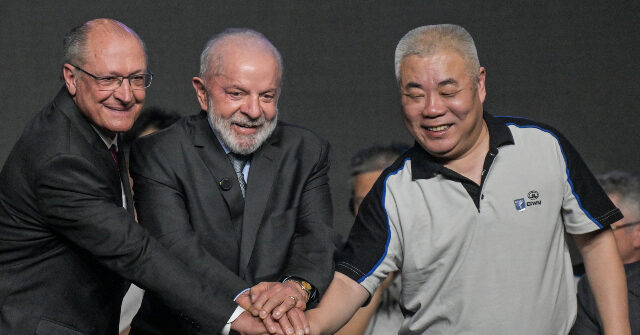Brazil’s socialist president, Luiz Inacio Lula da Silva, declared Brazil is “open for business” at the opening ceremony for a Chinese automobile plant in Sao Paulo on Friday.
“Count on the Brazilian government. Whoever wants to leave, leave. Whoever wants to come, we welcome you with open arms,” Lula said.
Lula seemed to be alluding to automakers Ford and Mercedes choosing to reduce their operations in Brazil over the past few years. Mercedes shuttered its modest factory in Sao Paulo in 2020, ostensibly due to reduced demand because of the coronavirus pandemic.
Ford pulled out of northeastern Brazil the following year, dealing a much larger blow to local economies by closing down three factories. Ford said it lost almost $12 billion trying to sell cars in Brazil.
Lula’s government likes to tell a story about Chinese automakers stepping in to claim a share of Brazil’s fast-growing electric vehicle (EV) market, although Ford’s Brazilian operation actually went bankrupt because it was trying to crank out tiny high-mileage subcompact cars instead of the SUVs that Brazilian buyers really wanted.
Other foreign auto companies have complained about Brazil’s clumsy bureaucracy, sky-high paperwork costs, and heavy import tariffs designed to shield local producers from overseas competition. Volkswagen, GM, and Toyota have all posted billion-dollar losses from their Brazilian operations, even during periods when the government was offering heavy subsidies to attract their business.
Lula was attempting to deflect these complaints with his “open for business” enthusiasm, mixed with a bit of petulance against companies that decided to “leave” his country’s difficult marketplace.
Chinese automaker BYD, currently the largest EV producer in the world, found an unconventional way to make the Brazilian market work: slave labor.
BYD opened a huge factory in Camacari, the turf abandoned by Ford in 2021, and then brought in hundreds of Chinese workers who were allegedly forced to work in “slavery-like” prison camp conditions, where the beds lacked mattresses and toilets were shared by dozens of men. Employees were reportedly forced to surrender up to 70 percent of their salaries to BYD to ensure their obedience, and faced huge fines on top of lost wages if they attempted to quit their jobs.
Skilled local workers complained the jobs promised from China’s investment all went to BYD’s indentured servants. The BYD factory was raided by Brazilian labor officials in April 2025, and Brazilian prosecutors filed suit against the EV giant in May. Meanwhile, another Chinese EV manufacturer called GWM (also known as the Great Wall Motor Co.) purchased the factory abandoned by Mercedes, with plans to produce up to 50,000 vehicles per year by the end of 2028. This was the plant whose grand opening Lula attended on Friday.
GWM said it plans to produce two sport utility vehicles and a pickup truck at its first plant, and is already searching for locations for a second plant in Brazil, possibly to produce battery packs for its vehicles. The company said it envisions selling up to 300,000 units in Brazil, even though GWM’s cars are substantially more expensive than the average price paid by Brazilian consumers.
Lula complained about President Donald Trump’s tariffs during his remarks, suggesting he would turn to China and the China-dominated BRICS economic bloc for relief from the “unnecessary turbulence” caused by Trump.
Lula’s government last week rolled out an aid package for Brazilian companies damaged by Trump’s tariffs, including special credit lines for export companies and subsidized purchases of unsold goods. Lula came up short of announcing retaliatory action against the United States, saying instead he would “insist on negotiating,” while declaring “our sovereignty is untouchable” and refusing to call President Trump.
Read the full article here


